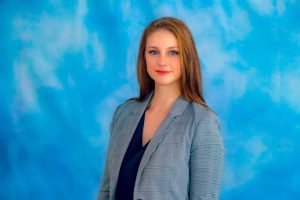Highlighting Faculty Member Bridget Callaghan
scarusoucla
Date published: 06/21/22
We often think of our mind and body as separate entities, one non-physical and the other physical. But how separable are they really? The Brain and Body Lab aims to find out.

The mind does not exist in a vacuum; it lives in context and it develops in context too. For babies and young people, parents and caregivers are one of the most significant contextual features in the early environment. While caregivers unquestionably shape the development of the mind, and the brain, they also shape the developing body. Behaviors, autonomic and endocrine systems, sleep and wake states, arousal, you name it – parenting affects it. The widespread regulation of children’s mind, brain, and body by caregivers can help to explain why early-life disruption in caregiving can have such a disastrous impact on an individual’s health across their lifespan, even impacting future generations. The Brain and Body Lab (BABLab) has been working to understand how caregiving impacts cross-talk between the mind, brain, and body, and how different biological systems outside of the brain can influence how we think and feel.
The research the BABLab conducts is highly interdisciplinary, combining in-depth behavioral analysis of children and parents with sophisticated neuroimaging approaches, hormonal assay, and microbiome analyses across numerous body sites. We work with a range of different families in our research, including those who are thriving and those who have had to overcome or are in the midst of experiencing significant caregiving challenges – e.g., foster care.
Together the BABLab group – undergraduates, graduate students, postdocs and Dr. Callaghan – are making discoveries in three important areas. First, we are looking at how experiences of caregiving adversity shape mental and physical health, and the functioning of the brain-gut-microbiome axis. We have shown that significant caregiving adversity is associated with higher anxiety and depression symptoms, as well as a range of physical health issues, such as headaches, stomachaches, and elevated pain. We have also demonstrated that the gastrointestinal microbiome – microorganisms that live in the gut – are affected after adverse caregiving, and might underlie changes to emotional and physical health. We have shown that caregiving affects the way the brain responds to the environment too. Second, we are examining how experiences of caregiving adversity might be perpetuated across generations. We have shown that maternal childhood maltreatment is associated with worsened mental health across the lifespan, as well as elevated emotional difficulties, different brain connectivity patterns, and altered microbiome in second-generation children. Third, we are investigating how positive parenting can surmount early challenges in the caregiving relationship, and arrest intergenerational patterns of adversity transmission. We have identified stronger feelings of security in a child’s relationship with their caregiver, parent’s speech patterns when reflecting on stressors, and parent’s emotional wellbeing as critical factors supporting resilience in youth exposed to caregiving adversity. Together we hope to use this research to make helpful recommendations to caregivers and policy makers about how to best support children’s wellbeing.
In addition to her research, Dr. Callaghan has been a Faculty in Residence at UCLA since 2021. Together with her family, Dr. Callaghan lives among the diverse undergraduate population residing in residential halls on ‘The Hill’. In this role, Dr. Callaghan uses her background and skills in clinical psychology to support the wellbeing of residential undergraduates, including evidence-based forms of stress reduction and self-care. Dr. Callaghan is passionate about supporting student’s wellbeing and teaches a Fiat Lux course on these topics in the spring.
Dr. Callaghan was born and raised in Sydney, Australia. After bouncing around to three different universities in Sydney, sampling a range of undergraduate majors, Dr. Callaghan settled on Psychology and completed both her undergraduate training and her Ph.D. at the University of New South Wales in Sydney’s eastern suburbs (a short bus ride from the famous Bondi Beach). After having her fill of Sydney’s hot summers, she moved to New York City with her husband to complete postdoctoral training at Columbia University. After five NYC winters, they packed their bags in 2019 and drove across the country with their anxious dog to arrive in sunny Los Angeles and have been content ever since. In her free time, Dr. Callaghan enjoys spending time with her husband, baby, and dog, relaxing at the beach, hiking, reading fiction, and crafting. She is unsuccessfully learning guitar.
Categories: Spotlight
